
the features of his “bike dock”.
(Photos by J. Maus/BikePortland)
Bike thieves have upped their game and rack manufacturers see a business opportunity.
Not content with using mere bolt-cutters to snip your cable lock or a mini car-jack to pry open your u-lock, thieves are now using power saws. Yes, power saws that can easily zing through the rounded pipes used in over 6,000 of those official blue “staple” Bureau of Transportation bike racks and countless street signs that people lock to when there’s no staple nearby.
Just this morning we learned about the latest power-saw-bike-theft victim via reddit.
Christopher Luyet hopes to capitalize on growing fears that standard bike racks can’t be trusted. He’s the president of Park A Bike, a Sacramento-based company that sells a range of bike parking products.
Luyet had been negotiating a sale with a southeast Portland building owner for several weeks when he heard about Gina Carlson. Carlson is the woman who had her $2,000 Trek stolen last week by someone who sawed through the rack and slipped her bike right off it.
“I told [my perspective customer], if you buy these racks from me I’ll buy Gina a new bike,” Luyet shared Wednesday during a product demo in Portland. The offer was accepted, so now there are nine of Luyet’s Varsity Bike Docks in front of a commercial building on SE Hawthorne (at 17th) and Carlson has a new bike coming.
Advertisement
Luyet’s “bike dock” is much different than a traditional staple rack. It looks like something out of Star Wars with its angled main bar, winged upper flanges and diamond-shaped feet. Luyet says the design was conceived with the help of David Takemoto-Weerts, the bicycle coordinator for one of the most bike-friendly cities in America; Davis, California.
There are several clear advantages of the Park A Bike design. The upper flanges are coated with rubber which not only prevents frame damage but keeps your bike from slipping around. The design also encourages proper, secure locking by making it easy to get a u-lock around your wheel, frame, and the elliptical bar. The wheel troughs are also a smart idea because they encourage users to place their wheels in the right place, which not only lines up the frame and wheel in the right spot for locking, but also creates a smaller, and more predictable sidewalk footprint when the bikes are locked.
And, according to Luyet, his rack is much more secure than a PBOT staple. “We use case-hardened steel, so you can’t come out here with a sawzall and cut this thing.” He also pointed out that his tubing is 1/8-inch thick — twice as stout as PBOT’s.
At $225-$325, the Park A Bike racks are significantly more expensive than PBOT’s staple racks, which cost the city just $80 a piece.
But ask someone like Gina Carlson if it’s worth it and you’ll get a quick answer. “Instead of just writing if off like they have been,” she said, “they need to install better bike racks.”



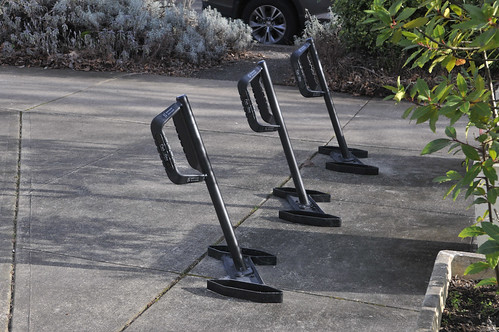
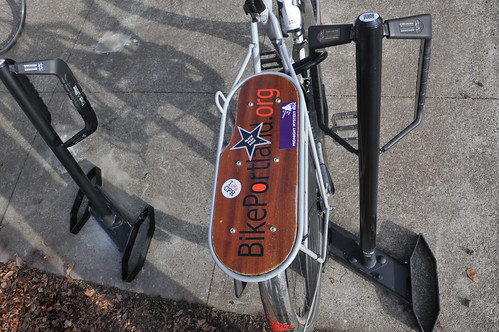
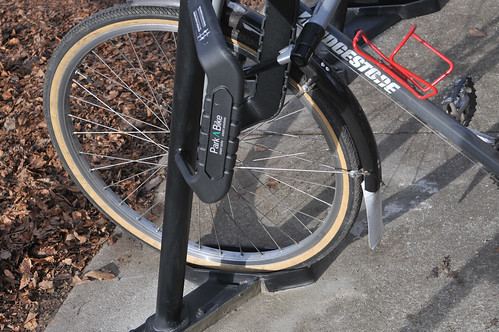

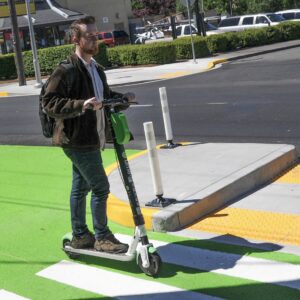
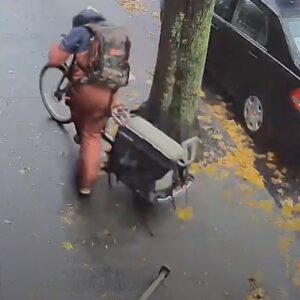


Thanks for reading.
BikePortland has served this community with independent community journalism since 2005. We rely on subscriptions from readers like you to survive. Your financial support is vital in keeping this valuable resource alive and well.
Please subscribe today to strengthen and expand our work.
Apart from what seem to be some assumptions about standard bike size and configuration (I can’t quite tell from the pictures and descriptions), this sounds like a meaningful step in the right direction.
Nope, my bike doesn’t fit inside it 🙂
Can’t lock to these racks using the Sheldon Brown method. No thanks.
That’s what I was thinking. I’ve got a Pitlock on the stem and front axle. So I always do the back wheel with the Sheldon method because that one doesn’t have a Pitlock.
Why don’t you just get that extra pitlock?
😉
Okay, first, a moment of silence for Sheldon. Now, with all due respect, he wasn’t right on this one. Sheldon believed that hack-sawing through a rear wheel would be nearly impossible because spoke tension would draw the rim closed on the blade, causing it to bind. This, combined with the tough-but-flexible beads on the tire, would render a hacksaw useless. I don’t think he ever tried it, because this turns out not to be true:
https://www.youtube.com/watch?v=H9fLtdZyX-A
You should lock your frame. There’s no good reason not to.
I don’t think people think it’s impossible to saw through a rear wheel. I just think it’s highly unlikely that a thief will sacrifice a back wheel to steal a bike. Front wheels are cheaper and much more easily replaced than back wheels.
The thief can still get money stealing bikes with a bum rear wheel; money is all that matters to them (money, drugs, other value exchange). Their choice is reduced value or zero value, and they are desperate for any value. They can swap in a wheel from some other theft. Even with a cut rim/tire, that wheel still has a hub and cogs they can sell. Still, it doesn’t seem to be a common M.O., at least in Portland, yet.
Locking just the frame has drawbacks, too. If the rack is cut, as is a common method recently, the bike is then rideable or rollable unless the wheels are locked some other way.
I’m not really sure it’s worth worrying about. Yes, cutting the rear wheel is possible, but I have never ever ever heard of it being done in anything but a demonstration context. Why would a thief cut a rear tire/wheel when there are plenty of cable locks and front wheel locked bikes out there?
I’ve heard of it happening (in Portland, even) but I guess the lesson I take is that the more stuff that’s well secured, the better my bike’s chance of remaining mine. So, a frame+wheel+rack lock-up is better than either frame+ or wheel+. And yeah, while bike theft is a big problem, your odds of keeping your bike with either frame+ or wheel + rack U-lock-up are still pretty good, way better than not locked or cable-locked.
And, of course, register your bike! (yet another recovery story today)
Adam, if you mean u-locking the bike through the back wheel, you should be able to back your bike into this rack and do the Sheldon-method.
This page has a picture of a bike parked in backwards: http://www.parkabike.com/bike-corrals-on-street-bike-parking
God bless Sheldon,
Edwin
I’ve used these type of racks before and they are not easy to lock with the Sheldon Brown method, while also keeping the rear wheel in the supplied wheel well.
Thats exactly the locking method I use. I have a security skewer for the front wheel. Having left my bike locked up for 3 days/nights straight at PSU, seems to work well!
I find the most convenient way to lock your back wheel is to install a wheel lock. It’ takes a second to lock and less time to unlock. Way handier than having a second U-lock and it’s bracket.
I wish Kryptonite would make one so that more stores in this continent would carry wheel locks.
(The best model I’m told is the Axa Defender.)
Wow, that is very interesting. I really hope that more businesses (and the city?) buy up these racks like hotcakes!
As a long-time Portland cyclist (going on 12 years now), I’m getting a tad nervous about leaving my bike locked up now that thieves are just cutting the racks.
Ignoring the “nice” features of rubber coatings and wheel placement help, how are these racks any more secure than a case-hardened, 1/8″-thick-wall tubing version of the current staples?
Now, what do you about the cordless angle grinder that can be easily purchased at Harbor Freight? http://images.harborfreight.com/manuals/66000-66999/66876.pdf
Any comments on how this rack works with longtails and front loading cargo bikes?
ummmm Yes you can use machine tools to saw through case hardened steel, and a 1/8″ thick wall is gonna add what? 5 seconds of sawing time?
Not gonna solve anything
The city has about 6000 of the staple bike racks. At $225 each, that would be 1.3 million dollars. These would be great for PSU or some other high-theft spot, but the city says that only a couple of staple racks get compromised each year. With money always in short supply, I don’t think this would be a good place to spend it.
Not gunna say what tool exactly, but as an ironworker I can buzz through that thing just as fast as a standard rack with a portable power tools.
There are other portable power tools to cut steel with other than sawzalls, hacksaws, and tube cutters. And you can’t even really stop them- you can only slow them down.
If someone really want’s your bike, there isn’t much you can do to stop them short of hiring an armed security detail to watch over it when you are away.
Question from a lay person: Would it actually help to coat regular staple racks with a thick layer of rubber (or a more sophisticated material) that would clog the cutting disc? Would be a good bang for the buck if it were possible — protect bike frames from scratches and improve theft protection at the same time.
Aside from smelling bad as it’s cut, not at all. I too am an Ironworker and I can safely say, there’s not a lock, rack, cable or anything that I couldn’t get through in about 20 seconds, at the longest.
Would filling the existing staples with gravel or concrete help?
I kind of feel like this is the wrong direction to pursue the end of bike theft. We can always build a better gadget, and someone else can always build a better saw. Isn’t the more productive way to address this through root causes instead of bandaids?
I agree I think that the bicycle manufacturers can do a lot more towards thwarting bike theft than guys with steel tube benders can .
Brazed on cafe locks with matching key front fork locks would do wonders.
Front fork locks have been around for ever, on many older bikes (like my Raleigh Superbe) they were standard issue.
Fill tubes with:
() 49% ground car tire
() 49% sulfur
() 1.9% BBQ lighter fluid
() 0.1% old fashioned smoky gunpowder
() a single magnesium wire from one end of the tube to the other (like a trick birthday candle)
Any cutting should turn this in to an acrid smoke cloud choking out the thief, reeking to high heaven and drawing attention from everywhere.
Lame and they look more expensive.
… they don’t have two points of contact with the bicycle and, therefore, would likely lead to a decrease in user satisfaction because their bikes tip over.
Yes they do: 1) locking location, 2) wheel well
I think a $225 bike rack paid for with public money will piss off a whole lot of public who don’t ride bicycles. Good luck selling the cost of even a few of these to a non-biking segment who think (rightly or wrongly) that we bicycle riders already get off cheap. A well-intentioned idea in a bad political landscape.
..::sigh::..
Here is some light humor on the subject. Dose anyone remember the security robot from Robocop? The one with a few bugs in its programming? What you do is to place one of those at each place that bicycles are stored then when a bike thief and start is merriment the security robot 20 seconds to stop and go away or he will turn that person into shredded meat. the only problem is getting the bugs out of the friend or foe system. Survivors will know there bike are safe and secure.
When you need to replace the same $80 bike stand a few times it will be cheaper to buy $225 ones in the long-run.
I’m pretty sure there’s an app for that….
It pisses me off to think that there are three parking spaces per vehicle in the country; that the average cost of a space is about $8000 (per Donald Shoup in No Free Parking); and that the cost of the spaces is mostly borne by the public at large.
If you thread a thick chain through the tubing of a standard staple, thieves won’t be able to sawzall through it.
Yup, and if the staple rack is square section tubing a pipe cutter won’t work.
Thank you, iron workers. As a bike shop employee, I often have to remove U-locks for people who lost their keys. I can second (or third) your experience–cutting through case-hardened steel is not difficult. In fact, it’s kind of fun, lots of sparks. These rack salespeople are being disingenuous in suggesting that their rack offers much more defense against power tools. And if the rack does slow the tools some, the U-lock becomes the weak link. The sad truth is that someone who isn’t afraid of making some noise and sparks can take any bike.
Our company just installed about three dozen of these over two locations. I like ’em so far: The rubber coating is nice so I can just drop my bike against the rack rather than “placing it”.
The wheel well feature works and my bike doesn’t tip over. The wheel wells are slightly offset, so two bikes can face the same way without clashing handlebars, or be facing the opposite way with one bike’s front wheel and the other bike’s rear wheel in the wells.
Having the two wings also gets bikes and bike locks away from each other and makes things look a little nicer.
Do I think they’ll hold up to power tools better than than staples? Probably not much, but for everything else, they’re a pretty slick setup.
“But ask someone like Gina Carlson if it’s worth it and you’ll get a quick answer.”
Is this really what should be driving our policy on bike theft prevention?
Having a bike stolen is rotten. More than rotten if it’s your primary mode of transpo and you can’t afford to replace it. But how many bikes have been stolen by defeating the blue staples? (I think your earlier article said one or two a year.) Such thefts make interesting news reads, complete with photos of the sawed pipe, but if we spend finite resources on preventing outlier thefts because they happen to make dramatic stories then we act unwisely.
Nope. It’s not what should be “driving our policy.” That’s why it isn’t. It’s nothing more than a line of copy in a blog post.
But I hear your point. While I definitely can relate to the temptation to sensationalize and do the easy story… I don’t agree with your point completely. It’s possible more racks are being sawed and if so, we need to talk about what that means and decide what – if any – actions to take.